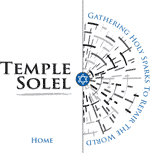Friday, October 14, 2011
Sukkot: Challenging the Way We Think About the Other Religions of the World
Sukkot is the perfect time of year for us to think about those who are religiously different from us. The very nature of the design of the sukkah (a walled structure that is also open) hails visitors and guests of all backgrounds to come in, and join the occupants for a meal.
The long-honored custom of ushpizin (of ritually welcoming guests into the sukkah for hospitality) also encourages diversity. Check out this attempt at an interfaith ushpizin ritual.
The non-permanence of the sukkah also suggests that the holiday is a time for us to meditate on breaking down boundaries/divisions, rather than establishing new ones.
This theme is also played out in the Haftarah reading that Jews around the world read on the first morning of Sukkot (this past Thursday). According to the prophet Zechariah, one of the things that might happen at the end of time is that: "The survivors of all the nations of the world who came against Jerusalem [and the Jewish People] shall annually go up to worship the Sovereign God of Heaven's Hosts and celebrate the festival of Sukkot" (Zechariah 14:16).
Some might read this passage as suggesting a fervent belief by our ancient Biblical ancestors that their religion was superior to all of the other religions of the world. And that, at the end of time, everyone else would realize the "error of their ways" and come to embrace Judaism as well.
But that would be a significant mistake. The passage doesn't say anything about everyone needing to be Jewish. It only suggests an immense value in having all of the people of the world do something (in this case, celebrate Sukkot) together.
Behind that statement is an assumption that we are more alike than we are different. And that whatever surface level religious beliefs might distinguish us from each other, at the end of the day we are all seeking a Higher Power and a worldview that will enable us to do Good in the world. And that, occasionally at least, it would be an awfully healthy thing if we were able to figure out a way to become friends with one another.
Off the top of my head, I would say that the Olympics are the closest we come in our society to actually pulling this off today. Once every four years (okay, every 2 for a Winter Games, and every 2 for a Summer Games), the whole world (regardless of race, religion, or political philosophy) comes together to celebrate, and compete in, Sport.
The bad news is that we have 287 days to go until the London Summer Games.
And, pending some other domestic or world crisis (God forbid), the only thing we have to distract ourselves with on television until then is...the Republican primary for the 2012 presidential election.
Remarkably...one of the dominant news stories coming out of that race thus far has been....the candidates' religion!
Watch this video from Chris Matthews' show on Hardball (Oct 13, 2011). It covers the basic background surrounding the suggestion by Rick Perry (and others associated with the Republican Party) that Mitt Romney (and, by extension, Jon Huntsman) are not qualified to be President because they are Mormons.
Some conservative Christians would discriminate against Mormons because of their religious beliefs. And some would discriminate against Catholics as well.
JFK's Catholicism has long been documented as an important component of the 1960 Presidential Campaign. But in 2011...we're still talking about this? Are people really going to cast their vote because they are suspicious of a candidate's religious affiliation?
I know...I'm naive. But it is so hard for me to believe that Americans are fixated on some one's religion in this day and age. Yes: I get that a person's religion informs their politics (my Judaism informs my politics, anyway). But - if I were ever to run for office - I don't think I would ever want someone to vote for or against me, just because I was Jewish. Voters should back the candidate that shares their overall values, and has a vision for the future of our country that they agree with.
So: my hope and prayer on this Sukkot is that the lessons of the holiday reach all of those in this country who would seek to use religion to divide us. Sukkot is a holiday that teaches us that our world will be better, and stronger, if we can find occasions when we can all join together: celebrating that which unites us...rather than that which pulls us apart.
Chag Sameach and Shabbat Shalom.
Subscribe to:
Post Comments (Atom)






No comments:
Post a Comment